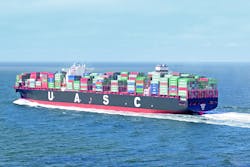Honeywell Process Solutions says its automation and safety technology has been selected for a pipeline project supplying natural gas from Central Asia to China.
Asia Trans Gas selected Honeywell’s Experion Process Knowledge System (PKS) and Safety Manager technology to manage operations and prevent safety problems in a third pipeline built as part of the Central Asia-China Gas Pipeline (CACGP) project. The first two are already in operation. Asia Trans Gas is a joint venture of China National Petroleum Corp. (CNPC) and Uzbekistan national holding company UzbekNefteGas,
"Pipelines present unique challenges because their length makes them more difficult for operators to monitor and respond to problems, but an integrated approach provides unparalleled visibility into their operations," said Aldous Wong, regional general manager, Honeywell Process Solutions, Greater China.
Experion PKS will be the integration and control software platform for the 530-kilometer pipeline. By integrating Honeywell’s Safety Manager software into the overall system, Experion improves safety practices for emergency shutdowns, equipment protection, fire and gas monitoring and critical control.
"Natural gas from Central Asia plays an important role in providing cleaner energy for China, and we expect demand to grow at 8 percent per year," said Li Lin, general manager, Asia Trans Gas.
The third pipeline, Line C, will run in parallel with the two existing, starting in Turkmenistan and cutting across Uzbekistan and Kazakhstan before reaching China’s western Xinjiang province. The A and B lines were completed in 2009. The existing control center will be upgraded based on Honeywell’s Distributed System Architecture (DSA).
Drives for power
The Siemens Drive Technologies Division is equipping 17 container ships owned by the United Arab Shipping Company (UASC) with a drive and power generation system, under contract from Hyundai Heavy Industries, the largest shipyard in the world.
Using a waste-heat recovery system (WHRS), exhaust gas from the propulsion main engine can produce additional electrical power from the ship’s exhaust gas. Power is generated with a lower overall fuel consumption while reducing CO2 emissions up to 12 percent.
The drive system is a shaft generator that operates both as motor or generator and automatically adapts to suit requirements via higher-level power management, reducing wear on the main drive and the auxiliary generators.
The class A-14 and A-18 UASC container ships have carrying capacity of 14,500 and 18,800 TEU respectively and are among the largest container vessels in the world. The ships have significant power requirements, which can be optimized. Siemens relies on a WHRS, which generates superheated steam from the hot exhaust gas and in turn drives a two-stage steam turbine. An additional exhaust gas turbine can be fed with excess exhaust gas not needed for turbo-charging. Together with the steam turbine, it drives an electric generator that generally supplies the entire on-board electric power system. WHRS fuel consumption is thereby reduced by up to 12 percent.
Surplus electric power can boost the ship’s propulsion system by means of the shaft generator and the Sinamics S120 frequency converter in the so-called power take-in (PTI) mode. The generator is mounted directly on the propeller shaft without gears. At low main-engine load, it operates as a generator in power take-off (PTO) mode to supply the electric mains. If the total power balance allows it, the auxiliary engines can be switched off.
"Due to extraordinary reduction of fuel cost, the total cost for container transportation will be reduced significantly," said Stefan Kraus, head of strategy, marine and shipbuilding, Siemens Drive Technologies Division.
Yokogawa and Yamal LNG
Yokogawa Electric Corp. says its subsidiary Yokogawa Europe Solutions B.V. has been awarded a contract by Yamgaz, a consortium of Technip and JGC Corp., to supply integrated control and safety systems (ICSS) for the Yamal LNG Project to build a liquefied natural gas plant and other facilities at Sabetta on Russia’s Yamal Peninsula, which is in northwest Siberia, above the Arctic Circle, in the Yamal-Nenets Autonomous District.
The Yamal LNG Project is one of Russia’s largest resource projects and is being undertaken by JSC Yamal LNG, which is jointly owned by Novatek, Russia’s largest independent oil and gas company, and Total, a major French energy company. A major integrated complex for the liquefaction of natural gas will be built that will have a design production capacity of 16.5 million tons per annum. The three process trains that will make up this complex will have an annual production output of 5.5 million tons each and are planned to be commissioned in 2016, 2017 and 2018, respectively.
Yokogawa will supply CENTUM VP integrated production control systems, ProSafe-RS safety instrumented systems, Exaquantum™ plant information management systems, PRM® integrated device management packages for the monitoring and diagnosis of plant equipment, analytical systems, analyzer shelters and operator training systems. Yokogawa will be responsible for delivery, engineering, installation, commissioning and operator training.
Russia holds one of the world’s largest natural gas reserves and is particularly active in the LNG field, with many projects underway. It is believed that there are many undeveloped natural gas fields on the Yamal Peninsula. Yokogawa systems are in use at 47 gas liquefaction plants and 42 LNG receiving terminals around the world, and are used by or are on order for a total of 54 LNG carriers.
Yokogawa has had a foothold in the Russian market since 1993, when it opened a representative office in Moscow. It says it has participated in very large energy development projects such as Sakhalin II, delivering control, monitoring, safety and other systems for two offshore platforms, the onshore production facilities and pipelines.


